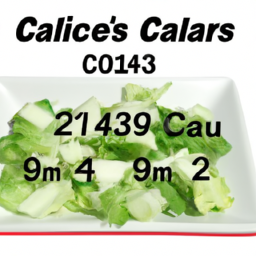Calories In Garden Salad How Many
How Many Calories In A Garden Salad
A Study of Calories in a Garden Salad
Calorie Count
Not all salads are created equal. The nutrition experts at Health Line report that a typical garden salad without a dressing contains approximately 80 calories with no fat or hidden calories. The calorie count of a garden salad can vary depending on the ingredients, such as what kind of fresh vegetables are used as well as the type of cheese and nuts which may be added. Most health-conscious salad consumers tend to forgo the creamier dressings in favor of the oil and vinegar variety as this reduces the overall calorie count significantly.
Vitamins & Minerals
A garden salad generally consists of some combination of lettuce, tomatoes, carrots, celery, cucumbers, bell peppers, and onions. This combination of vegetables provides a salad with many essential vitamins, minerals, and antioxidants. Lettuce, for example, is a good source of vitamin A, vitamin C, and folate, while carrots are a great source of vitamin A, K, and B6. Tomatoes are a strong source of vitamin C and lycopene, while celery is a great source of vitamin K and fiber.
The Positive Impact
Aside from being highly nutritious, a garden salad is also low in fat and calories, making it an excellent choice as a dietary staple. A side garden salad can accompany almost any meal to increase the nutrient value of that meal. Additionally, because they are comparatively low in calories, garden salads can be eaten in large quantities for those looking to lose weight or following a calorie-restricted diet.
The Negative Impact
On the other hand, those who are looking to gain weight are not likely to get any significant calorie gains from a garden salad. Additionally, the lack of fat and protein contained in a garden salad may make it difficult for those who are eating a garden salad as their primary meal of the day. The low-calorie count and lack of fat and protein make it difficult for a raw garden salad to provide the body with much in the way of sustenance.
Conclusion
In conclusion, garden salads are very healthy and can be a great addition to any meal. However, a garden salad should not be the sole source of sustenance, and their calorie count should be taken into consideration when planning a healthier diet. Garden salads are a great source of vitamins, minerals, and antioxidants, and may be eaten in large quantities without adding excess calories or fat to a diet.
Insights
An individual garden salad is relatively low in calories and fat, and is a great way to get essential vitamins and minerals in any meal. However, garden salads should not be relied upon as the sole food source, as they still don't contain any sources of protein or fat, elements which the body still needs for optimal health. By planning meals that combine a garden salad with other healthy options, it's possible to get a balanced and beneficial meal.

Previous Page
Next Page
